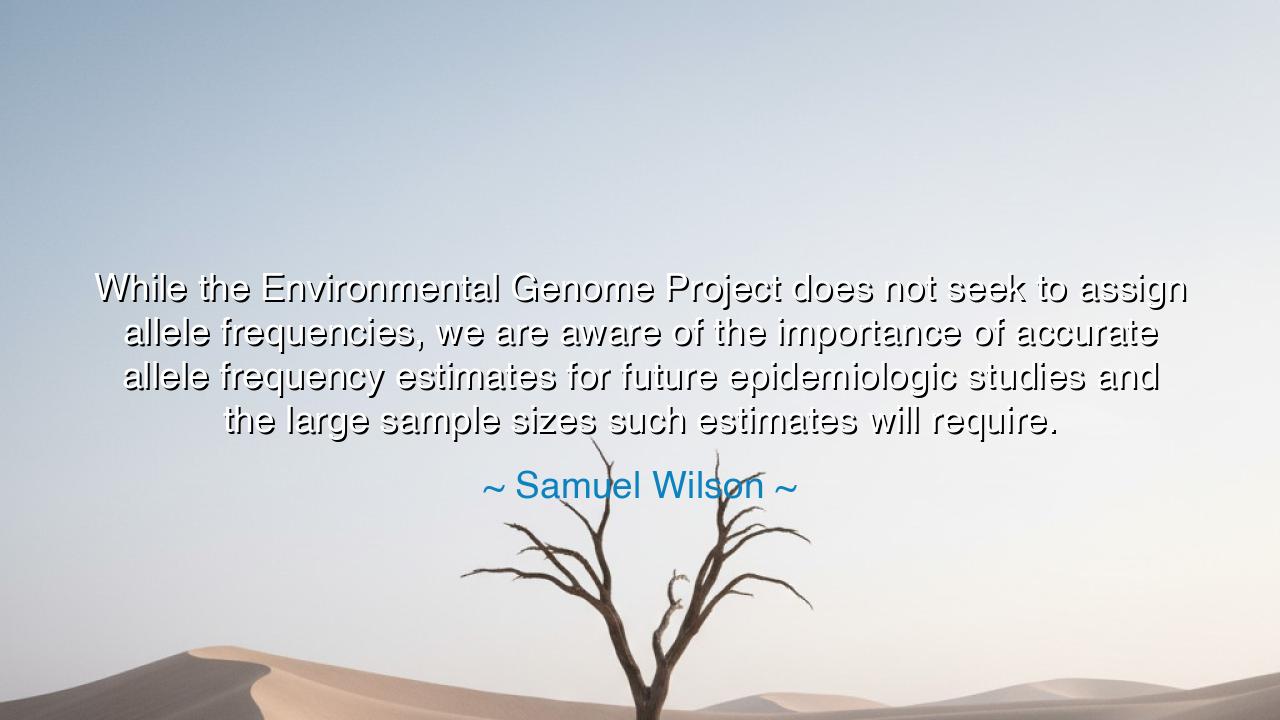
While the Environmental Genome Project does not seek to assign
While the Environmental Genome Project does not seek to assign allele frequencies, we are aware of the importance of accurate allele frequency estimates for future epidemiologic studies and the large sample sizes such estimates will require.






In the quiet dawn of scientific understanding, Samuel Wilson spoke of the Environmental Genome Project, a grand endeavor born from humanity’s desire to know itself—not only through the stars of destiny but through the code of life hidden within our cells. His words, “While the Environmental Genome Project does not seek to assign allele frequencies, we are aware of the importance of accurate allele frequency estimates for future epidemiologic studies and the large sample sizes such estimates will require,” are more than mere scientific caution. They are a testament to humility, foresight, and the wisdom that progress must be patient and precise, for truth cannot be rushed. He reminds us that even the greatest quests for knowledge must be rooted in discipline, lest we mistake the shadow of data for the light of understanding.
The Environmental Genome Project sought to uncover how the environment we breathe, touch, and consume dances with our genes, shaping health and fate alike. Yet Wilson, in his wisdom, refrained from claiming mastery over the allele frequencies—those subtle patterns that determine how often a genetic variation appears among people. Why? Because he knew that the numbers themselves are not the treasure; it is their meaning that matters. To estimate them wrongly would be to build the temple of medicine upon sand. Thus, he called upon the generations of researchers not to rush for answers, but to gather large sample sizes, to listen to the song of the genome in full chorus, not in fragmented echoes.
In these words lies a truth as ancient as the philosophers of old: that knowledge without patience is folly. Just as the early astronomers who charted the heavens waited night after night for the constellations to return, so too must scientists wait for data to reveal its patterns. When Gregor Mendel, the humble monk, tended his garden of peas, he did not seek fame, nor did he distort his findings to please kings or scholars. He recorded each color, each height, each trait—slowly, faithfully, reverently. Only generations later did humanity understand the full power of his work. Mendel’s patience is the mirror to Wilson’s warning: that the pursuit of truth demands both rigor and restraint.
There is also a moral lesson woven within Wilson’s technical caution. He speaks not only to scientists but to all who seek clarity in a world of complexity. Whether we measure genes, emotions, or destinies, we are tempted to assign quick meanings, to count what is easily visible, and ignore the vast unseen. But wisdom reminds us that life, like the genome, cannot be grasped in haste. The “large sample sizes” he mentions become a metaphor for experience, for the need to gather many moments, many perspectives, before claiming to know the nature of reality.
Consider the story of the great explorer Alexander von Humboldt, who traveled through jungles and mountains, collecting data not just from one tree or one bird, but from entire ecosystems. He saw the interconnectedness of life—how soil, climate, and species form one breathing network. If Humboldt had measured only what was near, he would have missed the grandeur of the whole. Likewise, Wilson urges us to see the full picture of human variation, to understand that the health of a species cannot be captured in a single study, nor the truth of a person in a single glance.
There is heroism in such patience. The ancients knew it well: that the greatest warriors were not those who struck the first blow, but those who waited for the right moment. So too in science, in art, in life—the strength lies in restraint, the courage in precision. To build a foundation for epidemiologic studies—the study of health and disease across populations—is to prepare a future where medicine is not guided by chance but by understanding. Wilson’s words are a prophecy: that only by honoring accuracy today can we save lives tomorrow.
And so, dear reader, take from this teaching a call to your own craft—whatever it may be. Be like the careful researcher: gather your truths with patience, measure your judgments with fairness, and never fear the long path to clarity. Whether you seek to understand people, build a dream, or heal a wound, remember that depth is born from diligence. Do not mistake the first answer for the final truth.
For in the end, the lesson of Samuel Wilson’s words is both scientific and spiritual: true knowledge is not gained by claiming certainty, but by honoring complexity. The world, like the genome, is vast and intertwined, and it yields its wisdom only to those humble enough to listen. Therefore, act with patience, seek with rigor, and let your pursuit of truth—whether in science or the soul—be as precise and noble as the calling that stirred the heart of Wilson himself.






AAdministratorAdministrator
Welcome, honored guests. Please leave a comment, we will respond soon